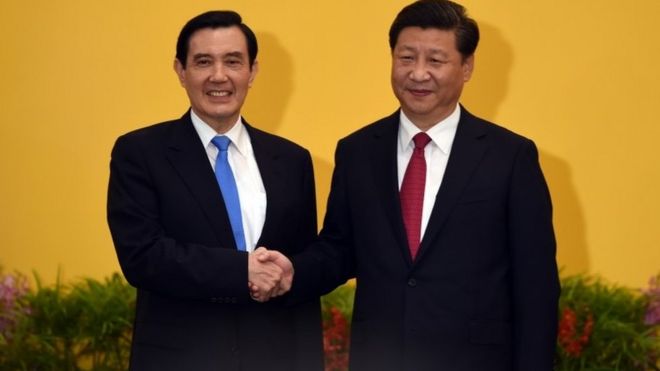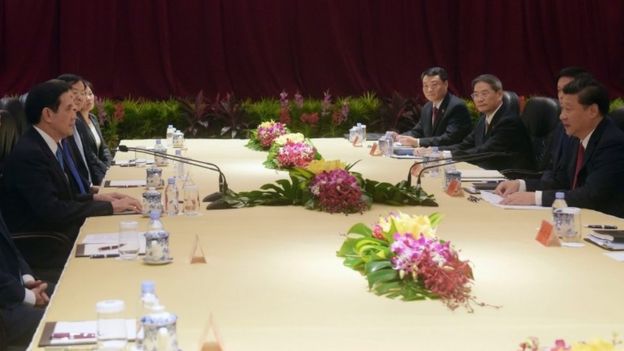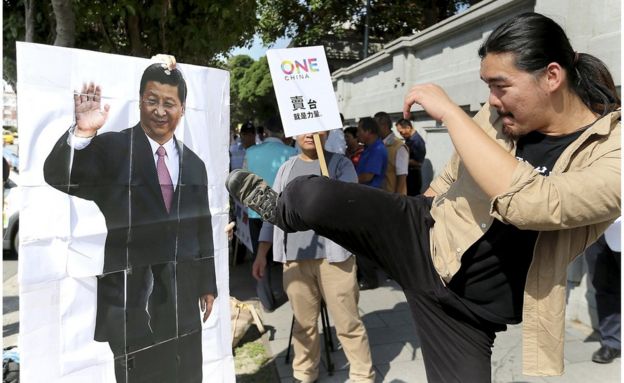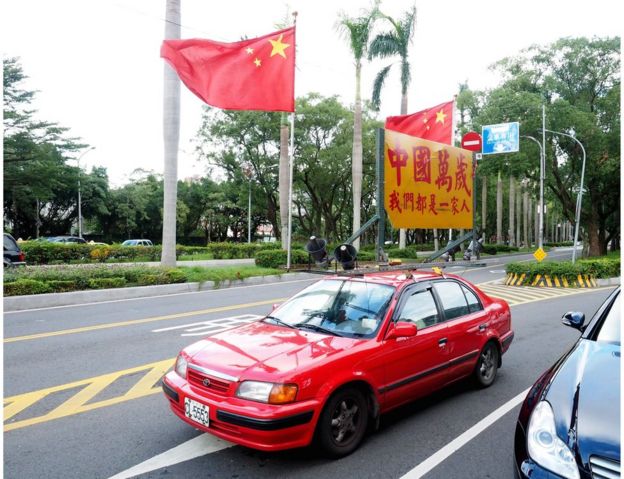
No major agreements appear to have been signed
The leaders of China and Taiwan have held historic talks in Singapore – their first in more than 60 years.
Chinese President Xi Jinping and Taiwan’s President Ma Ying-jeou shook hands at the start of the talks, which were seen as largely symbolic.
China views Taiwan as a breakaway province which will one day be reunited with the mainland.
But many Taiwanese see it as independent and are concerned at China’s growing influence.
The awkward questions that could crop up
What’s behind the China-Taiwan divide?
“Both sides should respect each other’s values and way of life,” Mr Ma said as the talks began at a luxury hotel.
Mr Xi told the Taiwanese leader: “We are one family.”

“The meeting between the leaders across the Taiwan Strait has opened a historic chapter in the cross-Strait relations, and history will remember today,” Mr Xi said.
The meeting took place in neutral territory on the sidelines of a state visit by Mr Xi to Singapore.
Relations between China and Taiwan have improved under Mr Ma since he took office in 2008, with better economic ties, improving tourism links, and a trade pact signed.
The two sides split in 1949 when the Kuomintang lost to the Chinese Communist Party in the civil war and set up a new government in Taiwan.
What wasn’t discussed
Mr Ma described the talks as “positive and friendly”, but no major agreements or deals appear to have been reached.
Mr Ma said in advance that the issue of the South China Sea disputes, which has dominated recent concerns in the region, would not be brought up.
Mr Xi raised the issue in a speech at the National University of Singapore before the meeting, saying China has always hoped to settle the disputes peacefully.
What was discussed
Mr Ma proposed reducing hostility across the Taiwan Strait, expanding exchanges and establishing a cross-strait hotline, according to Taiwan’s central news agency.
He said this was part of consolidating the “1992 consensus” – the agreement under which both sides recognise the principle of “one China” but define it in their own ways.
Similar remarks were made by Mr Xi, who said upholding the consensus would help “the great rejuvenation of the Chinese nation”.
Taiwan-China key dates
1949: Chiang Kai-shek’s Kuomintang (KMT) nationalists form their own government in Taiwan after Mao Zedong’s communists take power in Beijing
- 1971: Taiwan loses its seat at the UN to China
- 1979: The US establishes diplomatic relations with China while at the same time committing itself to defending Taiwan
- 1993: First direct talks between the two sides take place in Singapore
- 2005: Beijing brings in a law that makes secession by Taiwan illegal, at the risk of military action
- 2008: High-level talks between the two sides resume after Ma Ying-jeou is elected president
The reaction in Taiwan and China
President Ma’s Kuomintang (KMT) Party is seen as pro-Beijing, which has led to warmer ties between the sides.
However, correspondents say growing fears over China’s influence have led to widespread dissatisfaction in Taiwan.
The KMT suffered a crushing defeat in local elections last year, a result that was widely seen as a rejection of Mr Ma’s push for closer ties with China.

Anti-Beijing protesters held protests in Taipei against the meeting…

but pro-unification groups have also demonstrated their support, with posters saying “Long live China, we are all one family”
In the Taiwanese capital there were protests before the talks and one group tried to enter the parliament building.
AFP said there were arrests at Taipei’s Songshan airport as Mr Ma left early on Saturday, where opponents of closer ties between Taiwan and China tried to set fire to images of the two leaders.
A small group supporting Mr Ma also turned up at the airport.
State media in China have heralded the meeting, though Taiwan has had a more divided reaction where opposition parties and activists have called for Mr Ma to back out.
“The Xi-Ma meeting has excited Chinese people worldwide… Applause will be heard globally for the victory of peace and rationality,” an editorial carried in the Chinese Communist Party mouthpiece People’s Daily.
It also took issue with those opposed to the meeting in Taiwan, saying critics “are displaying jiggery-pokery from a small circle. Such extremism is bound to be stigmatised”.
BBC
 Q FM Africa's Modern Radio
Q FM Africa's Modern Radio